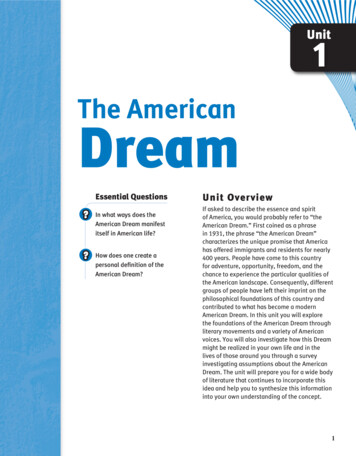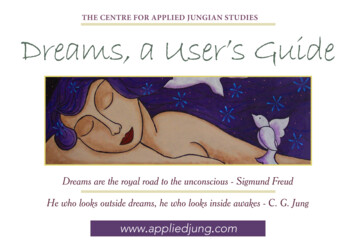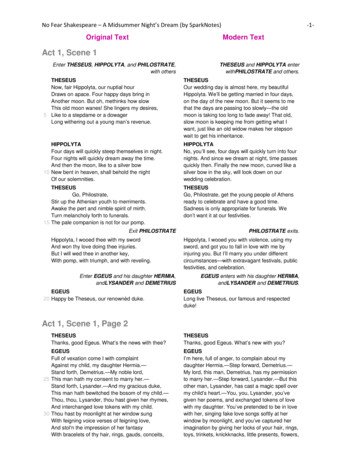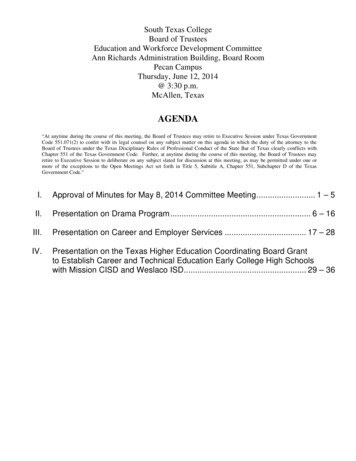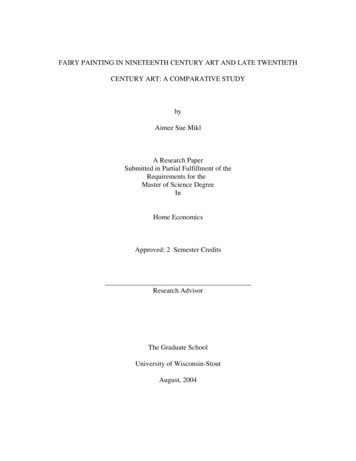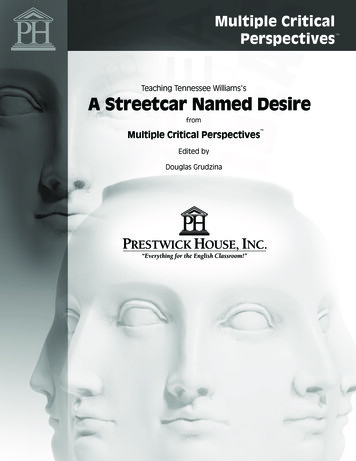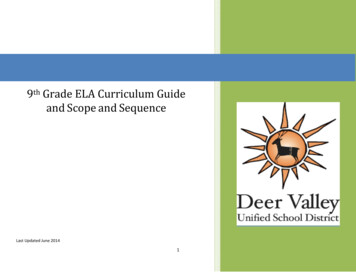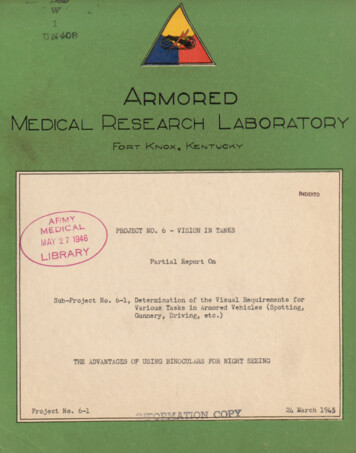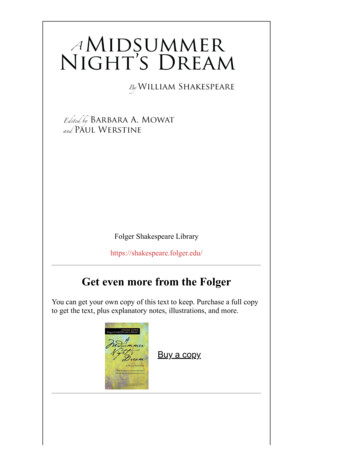
Transcription
Folger Shakespeare Libraryhttps://shakespeare.folger.edu/Get even more from the FolgerYou can get your own copy of this text to keep. Purchase a full copyto get the text, plus explanatory notes, illustrations, and more.Buy a copy
ContentsFrontMatterFrom the Director of the Folger ShakespeareLibraryTextual IntroductionSynopsisCharacters in the PlayACT 1Scene 1Scene 2ACT 2Scene 1Scene 2ACT 3Scene 1Scene 2ACT 4Scene 1Scene 2ACT 5Scene 1
From the Director of the Folger ShakespeareLibraryIt is hard to imagine a world without Shakespeare. Since theircomposition four hundred years ago, Shakespeare’s plays and poemshave traveled the globe, inviting those who see and read his works tomake them their own.Readers of the New Folger Editions are part of this ongoing processof “taking up Shakespeare,” finding our own thoughts and feelingsin language that strikes us as old or unusual and, for that very reason,new. We still struggle to keep up with a writer who could think amile a minute, whose words paint pictures that shift like clouds.These expertly edited texts are presented to the public as a resourcefor study, artistic adaptation, and enjoyment. By making the classictexts of the New Folger Editions available in electronic form as TheFolger Shakespeare (formerly Folger Digital Texts), we place atrusted resource in the hands of anyone who wants them.The New Folger Editions of Shakespeare’s plays, which are the basisfor the texts realized here in digital form, are special because of theirorigin. The Folger Shakespeare Library in Washington, DC, is thesingle greatest documentary source of Shakespeare’s works. Anunparalleled collection of early modern books, manuscripts, andartwork connected to Shakespeare, the Folger’s holdings have beenconsulted extensively in the preparation of these texts. The Editionsalso reflect the expertise gained through the regular performance ofShakespeare’s works in the Folger’s Elizabethan Theatre.I want to express my deep thanks to editors Barbara Mowat and PaulWerstine for creating these indispensable editions of Shakespeare’sworks, which incorporate the best of textual scholarship with arichness of commentary that is both inspired and engaging. Readerswho want to know more about Shakespeare and his plays can followthe paths these distinguished scholars have tread by visiting theFolger either in-person or online, where a range of physical anddigital resources exists to supplement the material in these texts. Icommend to you these words, and hope that they inspire.Michael WitmoreDirector, Folger Shakespeare Library
Textual IntroductionBy Barbara Mowat and Paul WerstineUntil now, with the release of The Folger Shakespeare (formerlyFolger Digital Texts), readers in search of a free online text ofShakespeare’s plays had to be content primarily with using theMoby Text, which reproduces a late-nineteenth century version ofthe plays. What is the difference? Many ordinary readers assume thatthere is a single text for the plays: what Shakespeare wrote. ButShakespeare’s plays were not published the way modern novels orplays are published today: as a single, authoritative text. In somecases, the plays have come down to us in multiple publishedversions, represented by various Quartos (Qq) and by the greatcollection put together by his colleagues in 1623, called the FirstFolio (F). There are, for example, three very different versions ofHamlet, two of King Lear, Henry V, Romeo and Juliet, and others.Editors choose which version to use as their base text, and thenamend that text with words, lines or speech prefixes from the otherversions that, in their judgment, make for a better or more accuratetext.Other editorial decisions involve choices about whether anunfamiliar word could be understood in light of other writings of theperiod or whether it should be changed; decisions about words thatmade it into Shakespeare’s text by accident through four hundredyears of printings and misprinting; and even decisions based oncultural preference and taste. When the Moby Text was created,for example, it was deemed “improper” and “indecent” for Mirandato chastise Caliban for having attempted to rape her. (See TheTempest, 1.2: “Abhorred slave,/Which any print of goodness wilt nottake,/Being capable of all ill! I pitied thee ”). All Shakespeareeditors at the time took the speech away from her and gave it to herfather, Prospero.The editors of the Moby Shakespeare produced their text longbefore scholars fully understood the proper grounds on which tomake the thousands of decisions that Shakespeare editors face. TheFolger Library Shakespeare Editions, on which the FolgerShakespeare texts depend, make this editorial process as nearlytransparent as is possible, in contrast to older texts, like the Moby ,which hide editorial interventions. The reader of the FolgerShakespeare knows where the text has been altered because editorialinterventions are signaled by square brackets (for example, fromOthello: “ If she in chains of magic were not bound, ”), half-squarebrackets (for example, from Henry V: “With blood and sword andfire to win your right,”), or angle brackets (for example, from
Hamlet: “O farewell, honest soldier. Who hath relieved/you?”). Atany point in the text, you can hover your cursor over a bracket formore information.Because the Folger Shakespeare texts are edited in accord withtwenty-first century knowledge about Shakespeare’s texts, the Folgerhere provides them to readers, scholars, teachers, actors, directors,and students, free of charge, confident of their quality as texts of theplays and pleased to be able to make this contribution to the studyand enjoyment of Shakespeare.
SynopsisIn A Midsummer Night’s Dream, residents of Athens mix with fairiesfrom a local forest, with comic results. In the city, Theseus, Duke ofAthens, is to marry Hippolyta, queen of the Amazons. Bottom theweaver and his friends rehearse in the woods a play they hope tostage for the wedding celebrations.Four young Athenians are in a romantic tangle. Lysander andDemetrius love Hermia; she loves Lysander and her friend Helenaloves Demetrius. Hermia’s father, Egeus, commands Hermia tomarry Demetrius, and Theseus supports the father’s right. All fouryoung Athenians end up in the woods, where Robin Goodfellow,who serves the fairy king Oberon, puts flower juice on the eyes ofLysander, and then Demetrius, unintentionally causing both to loveHelena. Oberon, who is quarreling with his wife, Titania, uses theflower juice on her eyes. She falls in love with Bottom, who now,thanks to Robin Goodfellow, wears an ass’s head.As the lovers sleep, Robin Goodfellow restores Lysander’s love forHermia, so that now each young woman is matched with the manshe loves. Oberon disenchants Titania and removes Bottom’s ass’shead. The two young couples join the royal couple in gettingmarried, and Bottom rejoins his friends to perform the play.
Characters in the PlayHERMIALYSANDERHELENAfour loversDEMETRIUSTHESEUS,duke of AthensHIPPOLYTA, queen of the AmazonsEGEUS, father to HermiaPHILOSTRATE, master of the revels to TheseusNICK BOTTOM,weavercarpenterFRANCIS FLUTE, bellows-menderTOM SNOUT, tinkerSNUG, joinerROBIN STARVELING, tailorPETER QUINCE,OBERON,king of the FairiesTITANIA, queen of the FairiesROBIN GOODFELLOW, a “puck,” or hobgoblin, in Oberon’s serviceA FAIRY, in the service of TitaniaPEASEBLOSSOMCOBWEBMOTEfairies attending upon TitaniaMUSTARDSEEDLords and Attendants on Theseus and HippolytaOther Fairies in the trains of Titania and Oberon
ACT 1Scene 1Enter Theseus, Hippolyta, and Philostrate, with others.THESEUSFTLN 0001FTLN 0002FTLN 0003FTLN 0004FTLN 0005FTLN 0006Now, fair Hippolyta, our nuptial hourDraws on apace. Four happy days bring inAnother moon. But, O, methinks how slowThis old moon wanes! She lingers my desiresLike to a stepdame or a dowagerLong withering out a young man’s revenue.5HIPPOLYTAFTLN 0007FTLN 0008FTLN 0009FTLN 0010FTLN 0011FTLN 0012FTLN 0013FTLN 0014FTLN 0015FTLN 0016FTLN 0017FTLN 0018FTLN 0019FTLN 0020Four days will quickly steep themselves in night;Four nights will quickly dream away the time;And then the moon, like to a silver bowNew -bent in heaven, shall behold the nightOf our solemnities.THESEUSGo, Philostrate,Stir up the Athenian youth to merriments.Awake the pert and nimble spirit of mirth.Turn melancholy forth to funerals;The pale companion is not for our pomp.Philostrate exits.Hippolyta, I wooed thee with my swordAnd won thy love doing thee injuries,But I will wed thee in another key,With pomp, with triumph, and with reveling.7101520
9A Midsummer Night’s DreamACT 1. SC. 1Enter Egeus and his daughter Hermia, and Lysanderand Demetrius.EGEUSFTLN 0021Happy be Theseus, our renownèd duke!THESEUSFTLN 0022Thanks, good Egeus. What’s the news with thee?EGEUSFTLN 0023FTLN 0024FTLN 0025FTLN 0026FTLN 0027FTLN 0028FTLN 0029FTLN 0030FTLN 0031FTLN 0032FTLN 0033FTLN 0034FTLN 0035FTLN 0036FTLN 0037FTLN 0038FTLN 0039FTLN 0040FTLN 0041FTLN 0042FTLN 0043FTLN 0044FTLN 0045FTLN 0046Full of vexation come I, with complaintAgainst my child, my daughter Hermia.—Stand forth, Demetrius.—My noble lord,This man hath my consent to marry her.—Stand forth, Lysander.—And, my gracious duke,This man hath bewitched the bosom of my child.—Thou, thou, Lysander, thou hast given her rhymesAnd interchanged love tokens with my child.Thou hast by moonlight at her window sungWith feigning voice verses of feigning loveAnd stol’n the impression of her fantasyWith bracelets of thy hair, rings, gauds, conceits,Knacks, trifles, nosegays, sweetmeats—messengersOf strong prevailment in unhardened youth.With cunning hast thou filched my daughter’s heart,Turned her obedience (which is due to me)To stubborn harshness.—And, my gracious duke,Be it so she will not here before your GraceConsent to marry with Demetrius,I beg the ancient privilege of Athens:As she is mine, I may dispose of her,Which shall be either to this gentlemanOr to her death, according to our lawImmediately provided in that case.THESEUSFTLN 0047FTLN 0048FTLN 0049What say you, Hermia? Be advised, fair maid.To you, your father should be as a god,One that composed your beauties, yea, and one2530354045
11FTLN 0050FTLN 0051FTLN 0052FTLN 0053A Midsummer Night’s DreamTo whom you are but as a form in waxBy him imprinted, and within his powerTo leave the figure or disfigure it.Demetrius is a worthy gentleman.ACT 1. SC. 150HERMIAFTLN 0054FTLN 0055FTLN 0056FTLN 0057So is Lysander.In himself he is,But in this kind, wanting your father’s voice,The other must be held the worthier.THESEUS55HERMIAFTLN 0058I would my father looked but with my eyes.THESEUSFTLN 0059Rather your eyes must with his judgment look.HERMIAFTLN 0060FTLN 0061FTLN 0062FTLN 0063FTLN 0064FTLN 0065FTLN 0066I do entreat your Grace to pardon me.I know not by what power I am made bold,Nor how it may concern my modestyIn such a presence here to plead my thoughts;But I beseech your Grace that I may knowThe worst that may befall me in this caseIf I refuse to wed Demetrius.6065THESEUSFTLN 0067FTLN 0068FTLN 0069FTLN 0070FTLN 0071FTLN 0072FTLN 0073FTLN 0074FTLN 0075FTLN 0076FTLN 0077FTLN 0078FTLN 0079FTLN 0080Either to die the death or to abjureForever the society of men.Therefore, fair Hermia, question your desires,Know of your youth, examine well your blood,Whether (if you yield not to your father’s choice)You can endure the livery of a nun,For aye to be in shady cloister mewed,To live a barren sister all your life,Chanting faint hymns to the cold fruitless moon.Thrice-blessèd they that master so their bloodTo undergo such maiden pilgrimage,But earthlier happy is the rose distilledThan that which, withering on the virgin thorn,Grows, lives, and dies in single blessedness.707580
13A Midsummer Night’s DreamACT 1. SC. 1HERMIAFTLN 0081FTLN 0082FTLN 0083FTLN 0084So will I grow, so live, so die, my lord,Ere I will yield my virgin patent upUnto his Lordship whose unwishèd yokeMy soul consents not to give sovereignty.THESEUSFTLN 0085FTLN 0086FTLN 0087FTLN 0088FTLN 0089FTLN 0090FTLN 0091FTLN 0092Take time to pause, and by the next new moon(The sealing day betwixt my love and meFor everlasting bond of fellowship),Upon that day either prepare to dieFor disobedience to your father’s will,Or else to wed Demetrius, as he would,Or on Diana’s altar to protestFor aye austerity and single life.8590DEMETRIUSFTLN 0093FTLN 0094Relent, sweet Hermia, and, Lysander, yieldThy crazèd title to my certain right.LYSANDERFTLN 0095FTLN 0096You have her father’s love, Demetrius.Let me have Hermia’s. Do you marry him.95EGEUSFTLN 0097FTLN 0098FTLN 0099FTLN 0100FTLN 0101FTLN 0102FTLN 0103FTLN 0104FTLN 0105FTLN 0106FTLN 0107FTLN 0108FTLN 0109FTLN 0110Scornful Lysander, true, he hath my love;And what is mine my love shall render him.And she is mine, and all my right of herI do estate unto Demetrius.LYSANDER, to TheseusI am, my lord, as well derived as he,As well possessed. My love is more than his;My fortunes every way as fairly ranked(If not with vantage) as Demetrius’;And (which is more than all these boasts can be)I am beloved of beauteous Hermia.Why should not I then prosecute my right?Demetrius, I’ll avouch it to his head,Made love to Nedar’s daughter, Helena,And won her soul; and she, sweet lady, dotes,100105110
15FTLN 0111FTLN 0112A Midsummer Night’s DreamACT 1. SC. 1Devoutly dotes, dotes in idolatry,Upon this spotted and inconstant man.THESEUSFTLN 0113FTLN 0114FTLN 0115FTLN 0116FTLN 0117FTLN 0118FTLN 0119FTLN 0120FTLN 0121FTLN 0122FTLN 0123FTLN 0124FTLN 0125FTLN 0126FTLN 0127FTLN 0128I must confess that I have heard so much,And with Demetrius thought to have spoke thereof;But, being overfull of self-affairs,My mind did lose it.—But, Demetrius, come,And come, Egeus; you shall go with me.I have some private schooling for you both.—For you, fair Hermia, look you arm yourselfTo fit your fancies to your father’s will,Or else the law of Athens yields you up(Which by no means we may extenuate)To death or to a vow of single life.—Come, my Hippolyta. What cheer, my love?—Demetrius and Egeus, go along.I must employ you in some businessAgainst our nuptial and confer with youOf something nearly that concerns yourselves.115120125EGEUSFTLN 0129With duty and desire we follow you.All but Hermia and Lysander exit.LYSANDERFTLN 0130FTLN 0131How now, my love? Why is your cheek so pale?How chance the roses there do fade so fast?130HERMIAFTLN 0132FTLN 0133Belike for want of rain, which I could wellBeteem them from the tempest of my eyes.LYSANDERFTLN 0134FTLN 0135FTLN 0136FTLN 0137Ay me! For aught that I could ever read,Could ever hear by tale or history,The course of true love never did run smooth.But either it was different in blood—HERMIAFTLN 0138O cross! Too high to be enthralled to low.LYSANDERFTLN 0139Or else misgraffèd in respect of years—135
17A Midsummer Night’s DreamACT 1. SC. 1HERMIAFTLN 0140O spite! Too old to be engaged to young.140LYSANDERFTLN 0141Or else it stood upon the choice of friends—HERMIAFTLN 0142O hell, to choose love by another’s eyes!LYSANDERFTLN 0143FTLN 0144FTLN 0145FTLN 0146FTLN 0147FTLN 0148FTLN 0149FTLN 0150FTLN 0151Or, if there were a sympathy in choice,War, death, or sickness did lay siege to it,Making it momentany as a sound,Swift as a shadow, short as any dream,Brief as the lightning in the collied night,That, in a spleen, unfolds both heaven and Earth,And, ere a man hath power to say “Behold!”The jaws of darkness do devour it up.So quick bright things come to confusion.145150HERMIAFTLN 0152FTLN 0153FTLN 0154FTLN 0155FTLN 0156FTLN 0157If then true lovers have been ever crossed,It stands as an edict in destiny.Then let us teach our trial patienceBecause it is a customary cross,As due to love as thoughts and dreams and sighs,Wishes and tears, poor fancy’s followers.155LYSANDERFTLN 0158FTLN 0159FTLN 0160FTLN 0161FTLN 0162FTLN 0163FTLN 0164FTLN 0165FTLN 0166FTLN 0167FTLN 0168FTLN 0169FTLN 0170A good persuasion. Therefore, hear me, Hermia:I have a widow aunt, a dowagerOf great revenue, and she hath no child.From Athens is her house remote seven leagues,And she respects me as her only son.There, gentle Hermia, may I marry thee;And to that place the sharp Athenian lawCannot pursue us. If thou lovest me, thenSteal forth thy father’s house tomorrow night,And in the wood a league without the town(Where I did meet thee once with HelenaTo do observance to a morn of May),There will I stay for thee.160165170
19FTLN 0171FTLN 0172FTLN 0173FTLN 0174FTLN 0175FTLN 0176FTLN 0177FTLN 0178FTLN 0179FTLN 0180FTLN 0181A Midsummer Night’s DreamACT 1. SC. 1My good Lysander,I swear to thee by Cupid’s strongest bow,By his best arrow with the golden head,By the simplicity of Venus’ doves,By that which knitteth souls and prospers loves,And by that fire which burned the Carthage queenWhen the false Trojan under sail was seen,By all the vows that ever men have broke(In number more than ever women spoke),In that same place thou hast appointed me,Tomorrow truly will I meet with thee.HERMIA175180LYSANDERFTLN 0182Keep promise, love. Look, here comes Helena.Enter Helena.HERMIAFTLN 0183Godspeed, fair Helena. Whither away?HELENAFTLN 0184FTLN 0185FTLN 0186FTLN 0187FTLN 0188FTLN 0189FTLN 0190FTLN 0191FTLN 0192FTLN 0193FTLN 0194FTLN 0195FTLN 0196FTLN 0197Call you me “fair”? That “fair” again unsay.Demetrius loves your fair. O happy fair!Your eyes are lodestars and your tongue’s sweet airMore tunable than lark to shepherd’s earWhen wheat is green, when hawthorn buds appear.Sickness is catching. O, were favor so!Yours would I catch, fair Hermia, ere I go.My ear should catch your voice, my eye your eye;My tongue should catch your tongue’s sweetmelody.Were the world mine, Demetrius being bated,The rest I’d give to be to you translated.O, teach me how you look and with what artYou sway the motion of Demetrius’ heart!185190195HERMIAFTLN 0198I frown upon him, yet he loves me still.HELENAFTLN 0199FTLN 0200O, that your frowns would teach my smiles suchskill!200
21A Midsummer Night’s DreamACT 1. SC. 1HERMIAFTLN 0201I give him curses, yet he gives me love.HELENAFTLN 0202O, that my prayers could such affection move!HERMIAFTLN 0203The more I hate, the more he follows me.HELENAFTLN 0204The more I love, the more he hateth me.HERMIAFTLN 0205His folly, Helena, is no fault of mine.205HELENAFTLN 0206None but your beauty. Would that fault were mine!HERMIAFTLN 0207FTLN 0208FTLN 0209FTLN 0210FTLN 0211FTLN 0212Take comfort: he no more shall see my face.Lysander and myself will fly this place.Before the time I did Lysander seeSeemed Athens as a paradise to me.O, then, what graces in my love do dwellThat he hath turned a heaven unto a hell!210LYSANDERFTLN 0213FTLN 0214FTLN 0215FTLN 0216FTLN 0217FTLN 0218Helen, to you our minds we will unfold.Tomorrow night when Phoebe doth beholdHer silver visage in the wat’ry glass,Decking with liquid pearl the bladed grass(A time that lovers’ flights doth still conceal),Through Athens’ gates have we devised to steal.215HERMIAFTLN 0219FTLN 0220FTLN 0221FTLN 0222FTLN 0223FTLN 0224FTLN 0225FTLN 0226And in the wood where often you and IUpon faint primrose beds were wont to lie,Emptying our bosoms of their counsel sweet,There my Lysander and myself shall meetAnd thence from Athens turn away our eyesTo seek new friends and stranger companies.Farewell, sweet playfellow. Pray thou for us,And good luck grant thee thy Demetrius.—220225
23FTLN 0227FTLN 0228ACT 1. SC. 1A Midsummer Night’s DreamKeep word, Lysander. We must starve our sightFrom lovers’ food till morrow deep midnight.LYSANDERFTLN 0229I will, my Hermia.FTLN 0230Helena, adieu.As you on him, Demetrius dote on you!FTLN 0231Hermia exits.230Lysander exits.HELENAFTLN 0232FTLN 0233FTLN 0234FTLN 0235FTLN 0236FTLN 0237FTLN 0238FTLN 0239FTLN 0240FTLN 0241FTLN 0242FTLN 0243FTLN 0244FTLN 0245FTLN 0246FTLN 0247FTLN 0248FTLN 0249FTLN 0250FTLN 0251FTLN 0252FTLN 0253FTLN 0254FTLN 0255FTLN 0256FTLN 0257How happy some o’er other some can be!Through Athens I am thought as fair as she.But what of that? Demetrius thinks not so.He will not know what all but he do know.And, as he errs, doting on Hermia’s eyes,So I, admiring of his qualities.Things base and vile, holding no quantity,Love can transpose to form and dignity.Love looks not with the eyes but with the mind;And therefore is winged Cupid painted blind.Nor hath Love’s mind of any judgment taste.Wings, and no eyes, figure unheedy haste.And therefore is Love said to be a childBecause in choice he is so oft beguiled.As waggish boys in game themselves forswear,So the boy Love is perjured everywhere.For, ere Demetrius looked on Hermia’s eyne,He hailed down oaths that he was only mine;And when this hail some heat from Hermia felt,So he dissolved, and show’rs of oaths did melt.I will go tell him of fair Hermia’s flight.Then to the wood will he tomorrow nightPursue her. And, for this intelligenceIf I have thanks, it is a dear expense.But herein mean I to enrich my pain,To have his sight thither and back again.235240245250255She exits.
25A Midsummer Night’s DreamACT 1. SC. 2Scene 2Enter Quince the carpenter, and Snug the joiner, andBottom the weaver, and Flute the bellows-mender, andSnout the tinker, and Starveling the tailor.FTLN 0258FTLN 0259FTLN 0260FTLN 0261FTLN 0262FTLN 0263FTLN 0264FTLN 0265FTLN 0266FTLN 0267FTLN 0268FTLN 0269FTLN 0270FTLN 0271FTLN 0272FTLN 0273FTLN 0274FTLN 0275FTLN 0276FTLN 0277FTLN 0278FTLN 0279FTLN 0280FTLN 0281FTLN 0282FTLN 0283FTLN 0284FTLN 0285FTLN 0286FTLN 0287FTLN 0288Is all our company here?BOTTOM You were best to call them generally, man byman, according to the scrip.QUINCE Here is the scroll of every man’s name whichis thought fit, through all Athens, to play in ourinterlude before the Duke and the Duchess on hiswedding day at night.BOTTOM First, good Peter Quince, say what the playtreats on, then read the names of the actors, and sogrow to a point.QUINCE Marry, our play is “The most lamentablecomedy and most cruel death of Pyramus andThisbe.”BOTTOM A very good piece of work, I assure you, and amerry. Now, good Peter Quince, call forth youractors by the scroll. Masters, spread yourselves.QUINCE Answer as I call you. Nick Bottom, the weaver.BOTTOM Ready. Name what part I am for, andproceed.QUINCE You, Nick Bottom, are set down for Pyramus.BOTTOM What is Pyramus—a lover or a tyrant?QUINCE A lover that kills himself most gallant for love.BOTTOM That will ask some tears in the true performingof it. If I do it, let the audience look to theireyes. I will move storms; I will condole in somemeasure. To the rest.—Yet my chief humor is for atyrant. I could play Ercles rarely, or a part to tear acat in, to make all split:QUINCEThe raging rocksAnd shivering shocksShall break the locks51015202530
27FTLN 0289FTLN 0290FTLN 0291FTLN 0292FTLN 0293FTLN 0294FTLN 0295FTLN 0296FTLN 0297FTLN 0298FTLN 0299FTLN 0300FTLN 0301FTLN 0302FTLN 0303FTLN 0304FTLN 0305FTLN 0306FTLN 0307FTLN 0308FTLN 0309FTLN 0310FTLN 0311FTLN 0312FTLN 0313FTLN 0314FTLN 0315FTLN 0316FTLN 0317FTLN 0318FTLN 0319FTLN 0320FTLN 0321FTLN 0322FTLN 0323FTLN 0324A Midsummer Night’s DreamACT 1. SC. 2Of prison gates.And Phibbus’ carShall shine from farAnd make and marThe foolish Fates.This was lofty. Now name the rest of the players.This is Ercles’ vein, a tyrant’s vein. A lover is morecondoling.QUINCE Francis Flute, the bellows-mender.FLUTE Here, Peter Quince.QUINCE Flute, you must take Thisbe on you.FLUTE What is Thisbe—a wand’ring knight?QUINCE It is the lady that Pyramus must love.FLUTE Nay, faith, let not me play a woman. I have abeard coming.QUINCE That’s all one. You shall play it in a mask, andyou may speak as small as you will.BOTTOM An I may hide my face, let me play Thisbe too.I’ll speak in a monstrous little voice: “Thisne,Thisne!”—“Ah Pyramus, my lover dear! Thy Thisbedear and lady dear!”QUINCE No, no, you must play Pyramus—and, Flute,you Thisbe.BOTTOM Well, proceed.QUINCE Robin Starveling, the tailor.STARVELING Here, Peter Quince.QUINCE Robin Starveling, you must play Thisbe’smother.—Tom Snout, the tinker.SNOUT Here, Peter Quince.QUINCE You, Pyramus’ father.—Myself, Thisbe’sfather.—Snug the joiner, you the lion’s part.—And I hope here is a play fitted.SNUG Have you the lion’s part written? Pray you, if itbe, give it me, for I am slow of study.QUINCE You may do it extempore, for it is nothing butroaring.35404550556065
29FTLN 0325FTLN 0326FTLN 0327FTLN 0328FTLN 0329FTLN 0330FTLN 0331FTLN 0332FTLN 0333FTLN 0334FTLN 0335FTLN 0336FTLN 0337FTLN 0338FTLN 0339FTLN 0340FTLN 0341FTLN 0342FTLN 0343FTLN 0344FTLN 0345FTLN 0346FTLN 0347FTLN 0348FTLN 0349FTLN 0350FTLN 0351FTLN 0352FTLN 0353FTLN 0354FTLN 0355FTLN 0356FTLN 0357FTLN 0358FTLN 0359FTLN 0360A Midsummer Night’s DreamACT 1. SC. 2Let me play the lion too. I will roar that I willdo any man’s heart good to hear me. I will roar thatI will make the Duke say “Let him roar again. Lethim roar again!”QUINCE An you should do it too terribly, you wouldfright the Duchess and the ladies that they wouldshriek, and that were enough to hang us all.ALL That would hang us, every mother’s son.BOTTOM I grant you, friends, if you should fright theladies out of their wits, they would have no morediscretion but to hang us. But I will aggravate myvoice so that I will roar you as gently as any suckingdove. I will roar you an ’twere any nightingale.QUINCE You can play no part but Pyramus, for Pyramusis a sweet-faced man, a proper man as oneshall see in a summer’s day, a most lovely gentlemanlikeman. Therefore you must needs playPyramus.BOTTOM Well, I will undertake it. What beard were Ibest to play it in?QUINCE Why, what you will.BOTTOM I will discharge it in either your straw-colorbeard, your orange-tawny beard, your purple-in-grainbeard, or your French-crown-color beard,your perfit yellow.QUINCE Some of your French crowns have no hair atall, and then you will play barefaced. But, masters,here are your parts, giving out the parts, and I amto entreat you, request you, and desire you to conthem by tomorrow night and meet me in the palacewood, a mile without the town, by moonlight. Therewill we rehearse, for if we meet in the city, we shallbe dogged with company and our devices known. Inthe meantime I will draw a bill of properties such asour play wants. I pray you fail me not.BOTTOM We will meet, and there we may rehearseBOTTOM707580859095100
31FTLN 0361FTLN 0362FTLN 0363FTLN 0364A Midsummer Night’s DreamACT 1. SC. 2most obscenely and courageously. Take pains. Beperfit. Adieu.QUINCE At the Duke’s Oak we meet.BOTTOM Enough. Hold or cut bowstrings.They exit.105
ACT 2Scene 1Enter a Fairy at one door and Robin Goodfellow atanother.ROBINFTLN 0365How now, spirit? Whither wander you?FAIRYFTLN 0366FTLN 0367FTLN 0368FTLN 0369FTLN 0370FTLN 0371FTLN 0372FTLN 0373FTLN 0374FTLN 0375FTLN 0376FTLN 0377FTLN 0378FTLN 0379FTLN 0380FTLN 0381Over hill, over dale,Thorough bush, thorough brier,Over park, over pale,Thorough flood, thorough fire;I do wander everywhere,Swifter than the moon’s sphere.And I serve the Fairy Queen,To dew her orbs upon the green.The cowslips tall her pensioners be;In their gold coats spots you see;Those be rubies, fairy favors;In those freckles live their savors.I must go seek some dewdrops hereAnd hang a pearl in every cowslip’s ear.Farewell, thou lob of spirits. I’ll be gone.Our queen and all her elves come here anon.ROBINFTLN 0382FTLN 0383The King doth keep his revels here tonight.Take heed the Queen come not within his sight,3551015
37FTLN 0384FTLN 0385FTLN 0386FTLN 0387FTLN 0388FTLN 0389FTLN 0390FTLN 0391FTLN 0392FTLN 0393FTLN 0394FTLN 0395FTLN 0396A Midsummer Night’s DreamACT 2. SC. 1For Oberon is passing fell and wrathBecause that she, as her attendant, hathA lovely boy stolen from an Indian king;She never had so sweet a changeling.And jealous Oberon would have the childKnight of his train, to trace the forests wild.But she perforce withholds the lovèd boy,Crowns him with flowers and makes him all herjoy.And now they never meet in grove or green,By fountain clear or spangled starlight sheen,But they do square, that all their elves for fearCreep into acorn cups and hide them there.202530FAIRYFTLN 0397FTLN 0398FTLN 0399FTLN 0400FTLN 0401FTLN 0402FTLN 0403FTLN 0404FTLN 0405FTLN 0406FTLN 0407FTLN 0408FTLN 0409FTLN 0410FTLN 0411FTLN 0412FTLN 0413FTLN 0414FTLN 0415FTLN 0416FTLN 0417FTLN 0418Either I mistake your shape and making quite,Or else you are that shrewd and knavish spriteCalled Robin Goodfellow. Are not you heThat frights the maidens of the villagery,Skim milk, and sometimes labor in the quernAnd bootless make the breathless huswife churn,And sometime make the drink to bear no barm,Mislead night wanderers, laughing at their harm?Those that “Hobgoblin” call you and “sweet Puck,”You do their work, and they shall have good luck.Are not you he?ROBINThou speakest aright.I am that merry wanderer of the night.I jest to Oberon and make him smileWhen I a fat and bean-fed horse beguile,Neighing in likeness of a filly foal.And sometime lurk I in a gossip’s bowlIn very likeness of a roasted crab,And, when she drinks, against her lips I bobAnd on her withered dewlap pour the ale.The wisest aunt, telling the saddest tale,Sometime for three-foot stool mistaketh me;35404550
39FTLN 0419FTLN 0420FTLN 0421FTLN 0422FTLN 0423FTLN 0424A Midsummer Night’s DreamACT 2. SC. 1Then slip I from her bum, down topples sheAnd “Tailor!” cries and falls into a cough,And then the whole choir hold their hips and loffeAnd waxen in their mirth and neeze and swearA merrier hour was never wasted there.But room, fairy. Here comes Oberon.5560FAIRYFTLN 0425And here my mistress. Would that he were gone!Enter Oberon the King of Fairies at one door, with histrain, and Titania the Queen at another, with hers.OBERONFTLN 0426Ill met by moonlight, proud Titania.TITANIAFTLN 0427FTLN 0428What, jealous Oberon? Fairies, skip hence.I have forsworn his bed and company.OBERONFTLN 0429T
Get even more from the Folger You c a n ge t your ow n c opy of t hi s t e xt t o ke e p. P ur c ha s e a f ul l c opy t o ge t t he t e xt , pl us e xpl a n



